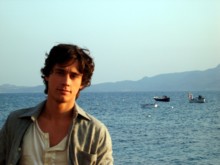
In the past weeks, Peter Gadiot has been a regular at the doctor's surgery, receiving treatment from the osteopath and having ice packs on his knees after suffering the heavy strain from rowing 3000 miles across the Atlantic ocean.
Now Peter is running The Marathon Des Sables (MDS - Marathon of the Sands) which is held for six consecutive days in the Saharan desert. It is considered the "toughest foot race on Earth".
The 250 km ultra marathon, which is the equivalent of 5½ regular marathons, includes running across ground with towering sand dunes, uneven rocky terrain and dangerous valleys.
The heat is one of the main challenges as mid-day temperatures can reach a suffocating 49°C (120°F) even in early April, made worse by the fact that the runners have to carry everything needed for the duration of the race in a rucksack. This includes food (which they must prepare from the stocks they carry), clothes, medical kit, sleeping bag, compass, torch, whistle, cooking equipment, anti-venom pump, signaling mirror, etc.
Water is strictly rationed throughout the race and handed out at each checkpoint in 1.5-litre bottles .
The longest single stage is 84 km (52 miles) long.
This is the third grueling event Peter has done in the last 6 months (a triathlon, rowing the Atlantic Ocean and this Ultra-marathon, for which Peter had no time to train because his Atlantic crossing was seriously delayed due to adverse weather conditions). Why would someone put his body through this much pain? Peter is bringing awareness to modern-day slavery in all its forms.
Although there has been a lot attention drawn to the issue of human trafficking and slavery in the recent months (the US president declared the whole month of January an anti-human trafficking month; in the UK, the house of commons had an exhibition; and an increasing number of celebrities are running campaigns about it), more needs to be done to fully eradicate this heinous crime.
Human trafficking is considered the second largest and fastest growing illegal industry in the world according to the United Nations, with 80% of victims being women and 50%, children (from a Trafficking in Persons report by the US Department of State).
Any donations of any amount towards our No Slavery project would be greatly appreciated. Please click HERE to donate.
.







 East Grinstead Courier & Observer, 7 Jan 2010
East Grinstead Courier & Observer, 7 Jan 2010




